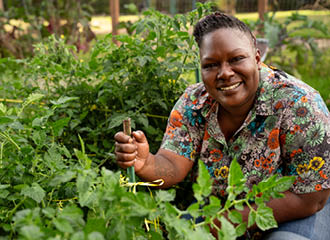Kelly’s Message to Veterans: “Tomorrow’s Another Day”
3-minute read
Kelly’s Message to Veterans: “Tomorrow’s Another Day”
3-minute read
When Kelly’s ex-husband, a fellow Veteran, took his own life without warning in early 2020, she tried to find the words to explain to their child why it happened.
“I had to let them know that I believe Chris forgot that tomorrow’s another day. That we do have the power and the right to wake up the next day and try to do something different,” says Kelly, a U.S. Navy Veteran who turned to mental health care to manage her own post-service challenges. “I think that it’s too easy, especially in this time, to let despair be all there is. We have to find someone that can hear us, encourage us and send us back out into the world to fight another day.”

“It's been transformative.” Veteran Shares How Therapy Helped Her Cope With Depression and Anxiety
Kelly also needed that encouragement — and found it in therapy. Now, by sharing the story of her challenges and how she managed them so she could thrive, she can inspire other Veterans to find hope in each new day.
Kelly’s story
Kelly joined the Navy in 2001 to become “part of something bigger than myself,” serving until 2006 as an operations specialist. While serving, she encountered racial bias, sexism and sexual violence. She recognizes it now as “cumulative trauma.”
“After that, it was incredibly difficult to feel safe at night, safe in crowds, safe even at work,” she says. “Leaving the military, it started to get harder and harder to be around people. Every new trauma would just wreck me.”
With each new trauma, like her mother’s cancer diagnosis, Kelly felt herself becoming more agitated and less motivated. “I didn’t want to go to work,” she recalls. “I’m a farmer. I run a nonprofit. I didn’t want to do any of those things.”
Kelly reached out to VA, hoping providers there could help.
“When I started doing therapy, it was like releasing the toxins, releasing the buildup of the fear, or the rage, or the overwhelming feelings of shame,” says Kelly, who was diagnosed with depression and anxiety. “Let a professional remind me that I am worthy of love and protection and safety. Let an expert remind me that I’ve done the best I can with the resources that I have, with the knowledge of resources that I have. It’s been transformative.”
Through therapy, Kelly learned techniques to manage her strong reactions and emotions. “It really is liberating to be able to say this thing happened to me and I am still hurt by it, but I can still have a day — I can still have a good day. I can still do things that make me feel fulfilled and happy,” she says.
Kelly finds fulfillment as a farmer — “part of this group of people feeding the world” — and as the founder and executive director of Acta Non Verba, Youth Urban Farm Project in Oakland, California.
The project offers low-income African American and Latino youths in the community the opportunity to plan, plant, harvest and sell produce, with 100% of the profits placed into participants’ educational savings accounts. Kelly views her nonprofit’s work as a way to prevent the sense of abandonment and despair she felt as a young child growing up in East Oakland during the crack cocaine epidemic.
Kelly also continues to receive support regularly through talk therapy and says she finds it freeing. “What therapy does for me is allows me to say what I need to say the way I need to say it,” she explains. “Just being able to tell the truth — that helps me every single day.”
To other Veterans considering mental health treatment, Kelly advises: “It’s one of the best things you can do for yourself and your family and friends. It is a game-changer, and you deserve it. You deserve to be listened to, to have your feelings heard, your thoughts heard. You deserve it.”

